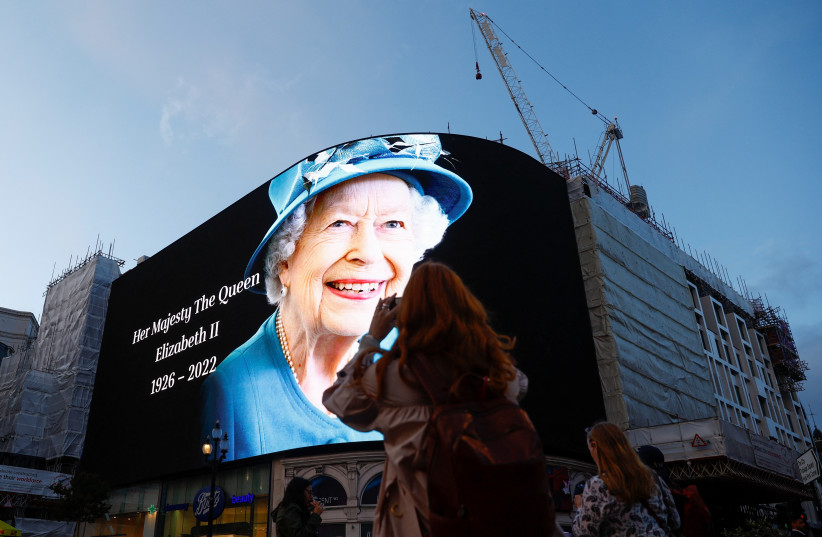The death of Queen Elizabeth II at the age of 96, after a 70-year reign, marks the end of an era not only for Britain and the Commonwealth but for the world as a whole. On Saturday, the newly proclaimed King Charles III addressed the people for the first time as their monarch and yesterday, the Queen’s funeral cortège began its journey from Scotland to London. Tributes for the late monarch poured in from around the globe and Israel, of course, also sent official condolences.
President Isaac Herzog said, “Queen Elizabeth was a historic figure: She lived history, she made history, and with her passing she leaves a magnificent, inspirational legacy...
“Throughout her long and momentous reign, the world changed dramatically, while the Queen remained an icon of stable, responsible leadership, and a beacon of morality, humanity and patriotism.”
Prime Minister Yair Lapid also offered condolences to the Royal Family and the people of the United Kingdom saying, “She leaves behind an unparalleled legacy of leadership and service.”
Leader of the opposition Benjamin Netanyahu, in his condolence message, said: “She was a legendary sovereign, a beacon of integrity and a steward of a second Elizabethan age, which will be remembered down the centuries.”

Chief Rabbi of Britain and the Commonwealth Rabbi Ephraim Mirvis, issued a special prayer in English and Hebrew which was recited in Orthodox synagogues throughout the UK and the Commonwealth on Shabbat just before the Prayer for the Royal Family, which read in part:
“In an age of profound change, she signified order and justice; and in times of tension, she offered generosity of spirit.
“A defender of faith with an unfailing sense of duty, she was a steadfast guardian of liberty, a symbol of unity and a champion of justice in all the lands of her dominion… In life, she was a most gracious monarch, who occupied a throne of distinction and honour. In death, may her legacy inspire the nations of the world to live together in righteousness and in peace.”
British Jewry also paid tribute to the late queen and amended the Prayer for the Welfare of the Royal Family to reflect the change in the monarchy.
Queen Elizabeth II was Britain’s longest reigning monarch and her passing will inevitably bring about changes. King Charles, who has waited so long to ascend the throne, presumably has his own ideas of how he sees the role and how to adapt it to the modern era. After a suitable period of mourning, necessary both on the personal and the national level, he will no doubt reveal them to the public and the world. One change, in particular, which will be interesting to watch for is how the new king sees his role as head of the Church of England and Defender of the Faith.
Israel wants an official visit from a British monarch
Something we in Israel would like to see in the future is an official visit. The queen traveled widely to some 120 countries, including those which were part of the Commonwealth and many that were not. Although she visited Jordan, Egypt and other countries in the Middle East and North Africa, she never set foot in Israel.
In 1994, her husband, Philip Duke of Edinburgh, became the first member of the immediate royal family to come to Israel when he paid a private visit. He came to honor his mother, Princess Alice of Greece, a Righteous Gentile who saved Jews during the Holocaust and who is buried on the Mount of Olives in Jerusalem. Two of the Queen Elizabeth’s sons, Prince Edward and the new King Charles, paid unofficial visits but only in 2018 did her grandson, Prince William, now next in line for the throne, pay an official royal visit, when Israel was celebrating its 70 years of independence. Charles returned in 2020, this time officially, for the commemoration of the 75th anniversary of the liberation of Auschwitz-Birkenau.
It is assumed that the reason the royal family in the past avoided Israel was in large part due to concerns by the British Foreign Office about a possible Arab backlash and maybe also due to resentment over the violence that marked the end of the British Mandate here.
The end of an era also marks the start of a new one. We send our condolences to the Royal Family, the British people and the British Commonwealth, and wish King Charles III the wisdom and fortitude necessary to carry out his duties successfully in challenging times. And we hope to see King Charles III and Queen Consort Camilla visit Israel in their official capacity as the heads of the British Royal Family. They would receive a royal welcome.
